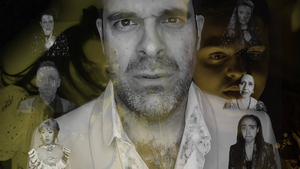Review: ROMEO AND JULIET, Creation Theatre Online
Digital production is Shakespeare with a difference
![]()

Oxford's Creation Theatre have carved out an innovative reputation for staging classic works of literature in inventive, unexpected places - they've had Dracula in The London Library, Don Quixote in Oxford's iconic covered market, and even The Tempest staged on an industrial estate.
Collaborating with Watford Palace on their latest offering, Romeo and Juliet, Creation's ninth digital production is a first as they endeavour to tell the beloved tale of Shakespeare's star-crossed lovers through a variety of platforms and technologies: live performance, filmed scenes and elements of interactivity woven together with a "choose your own adventure"-style thread where audiences have a hand in driving the story.
Shakespeare and gaming seem like a striking combination, and the piece as a whole feels refreshing in light of that; one just longs for the concept to have a little more commitment. Audiences choose when they book whether to be a Montague or Capulet, and at least from the Capulet side, we're only given a single choice in the first act - what we drink with Nurse at the Capulet Ball. By the time we reach the second act and have more influence over our choices, there is nonetheless an inevitability to proceedings. There remains a charming sense of joy and excitement that abounds in the chaotic, neon-lit "do you bite your thumb at us?" brawl in the opening moments of the play over Zoom, alongside a familiar joy in being part of an audience where you can see your fellow viewers
Shakespeare enthusiasts will likely enjoy the inclusion of lines from other plays - Vera Chok's Lady Capulet gives a beautifully haunting "Tomorrow and tomorrow and tomorrow" from Macbeth. You could argue that such moments slow the pace and aren't needed, but they piqued my interest at times where it lagged, as did gender-swapped turns from Clare Humphrey's Sister Lauren (usually Friar Laurence) and a spirited Benvolio from 2020 RADA graduate Harmony Rose Bremner.
Ryan Dawson Laight's design, though atmospheric, also feels rather disjointed at times: riots of colour and the superimposition of the cast onto the screen and the way they overlap distract from the emotional punch. Tybalt's fateful duel with Mercutio starts off beautifully in black and white but loses focus due to the over-busy editing. Having actors address the camera rather than one another feels odd too, especially during Romeo and Juliet's declaration of love amidst a starry night sky: perhaps the constraints of the pandemic don't translate as well as they might for a play that is so reliant on intimacy and character interaction. That said, it's hugely easy to see the passion and ambition at play, and I was left excited imagining how the experience will differ post-pandemic when actors and performers can once again share the same space.
The 13-strong cast make this piece come alive, not the technical wizardry. Amongst the assemblage are numerous actors known for their Shakespeare credits, leaving you in capable hands. RSC veteran Katy Stephens is a joy as Nurse, as is Darmesh Patel as Mercutio, who walks the fine line between comedic and dramatic moments with ease and aplomb.
Our lovers, played by Kofi Dennis and Annabelle Terry, prove an endearing pair, each finding nuances in the role that feel exciting: Terry's Juliet is spirited and feisty, whereas Dennis' Romeo seems to grow into his character as the piece goes on. In previous iterations of this play, that dynamic has felt reversed: it's lovely to see the playful sense in Natasha Rickman's direction come to the fore as needed. Dennis also showcases a remarkable ability to communicate an urgency that can sometimes get lost within the Zoom format: Romeo's soliloquies are here among the strongest in the play.
Elsewhere, Sebastian Capitan Viveros, Giles Stoakley and Graeme Rose bring scene-stealing gravitas to Tybalt, Prince and Capulet respectively, making a lasting impression despite their comparatively scant appearances.
As live theatre tentatively returns, its wonderful to see companies like Creation take bold and promising leaps in their digital work. Even if the result here doesn't always land, this Romeo and Juliet strikes many a bold note and leaves one hoping for further work from Creation of comparable ambition.
Romeo and Juliet available online until 23 May
Photo of Giles Stoakley (centre) as the Prince c. Creation Theatre
Reader Reviews

Videos

